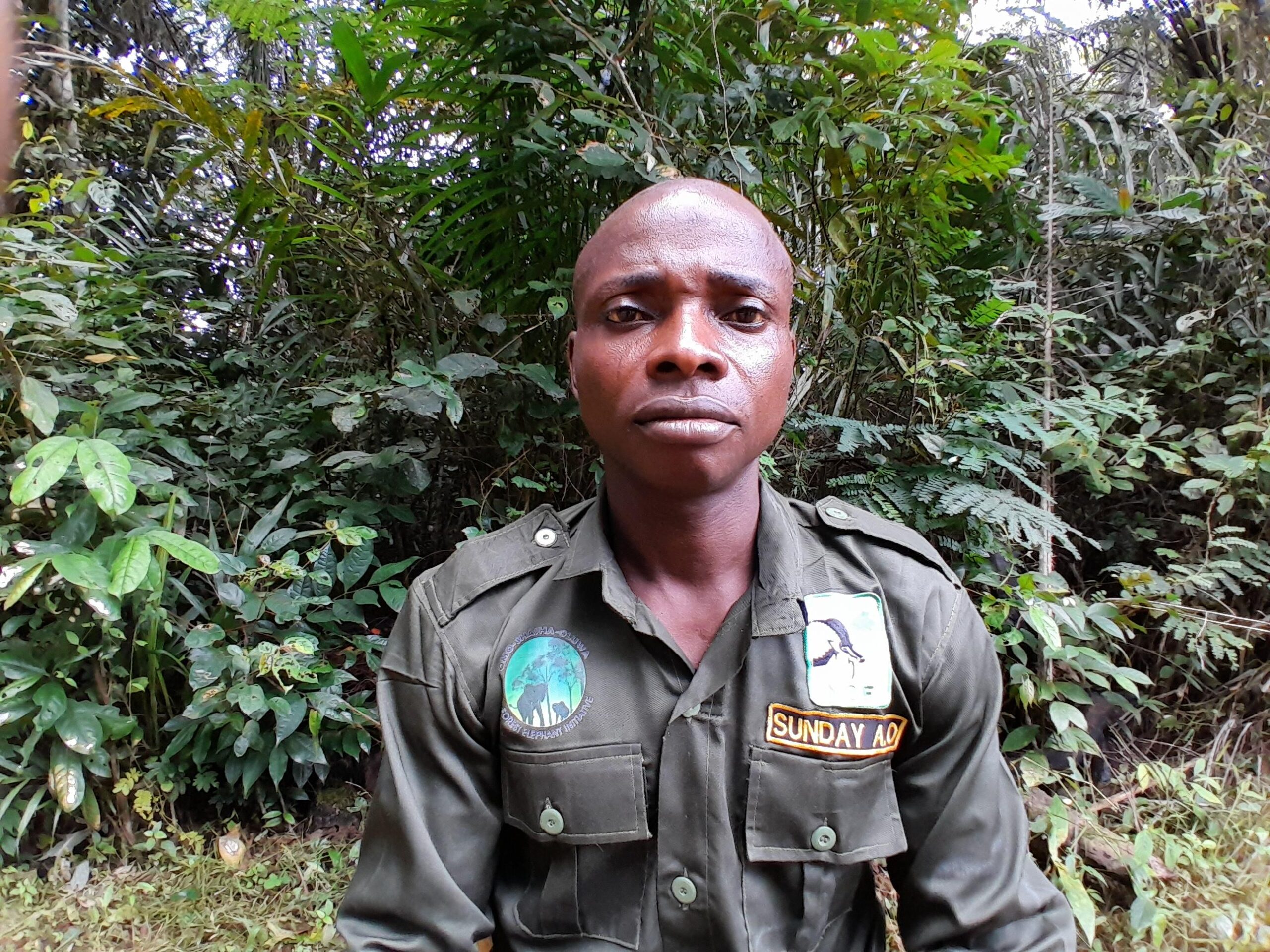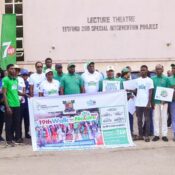
From Hunter to Guardian: The Journey of a Former Poacher Turned Ranger
For many years, Sunday Abiodun traversed the forests of Ogun State as a hunter, following in the footsteps of his father and grandfather. What began as a means of survival gradually revealed a deeper truth about the fragile balance of nature. Today, Sunday is no longer a poacher but a dedicated ranger with the Nigerian Conservation Foundation (NCF), working tirelessly to protect the same animals and forests he once hunted. In this candid conversation, Sunday shares his remarkable transformation from a life driven by necessity to one defined by purpose and offers a rare glimpse into what it means to trade the hunter’s gun for a ranger’s badge in defense of Nigeria’s wildlife. The interview was conducted at Omo Forest reserve.

Mr. Sunday Abiodun at Omo Forest Reserve. Image Credit: Nigerian Conservation Foundation.
What first drew you to poaching, and what did that life mean to you at the time? What wildlife were you targeting?
The reason wasn’t just because I wanted bushmeat. To me, hunting was a way of life. My father was a hunter, as well as my grandfather. I met it at home. My father was a great hunter, and I chose to follow in his footsteps to make a living.
Back then, I didn’t know anything about wildlife or conservation. Hunting wasn’t easy either. What I got from it was just enough to feed my immediate family, but still, it was not enough. There were times I would go for days, weeks, or even a month without getting any bushmeat, though sometimes I was lucky.
The wildlife I was targeting then weren’t that big. My grandfather told us not to go for big animals like the red river hog or bushbuck, but only for the smaller ones like porcupines, duikers, and sometimes monkeys.
Was there a single moment or experience in the forest that made you start questioning your role as a poacher?
Yes, I faced a lot of challenges in the forest. There was a time I shot a duiker and went to pick it up, then I heard a strange voice in the middle of the forest echoing, “Pick it up now.” I ran home immediately and told my father. He said strange things happen in the forest, and as a hunter, you’ll see and hear many things. After this experience in a community forest not too far from Omo, I started rethinking my life’s choices.
How did your view of wildlife and nature change over time, and what triggered that change?
When I was a poacher, I didn’t know about conservation. All I did was go into the bush, kill animals, cut down trees, and remove plants. The change started for me when I realized that some of the animals I used to encounter while hunting are no longer there or have become very rare. For example, it’s been a long time since a leopard was last seen around here, and forest buffalo are no longer sighted as frequently as before. Being a ranger has equipped me wiith knowledge about the changes in the forest and helped me understand that protecting wildlife requires conscious and deliberate effort to save them from extinction. Not just the animals but the trees as well. I now also preach the gospel of conservation to people around me.
Can you describe the internal conflict you felt as you transitioned from taking life to protecting it?
It’s not easy to move from killing animals to protecting them. Sometimes, the feelings of being a hunter still come. When that happens, I remind myself of the value and impact of the work I’m doing now and how vital it is to the ecosystem and the protection of animals. That thought fuels me to stay committed to protecting them.
How did guilt, empathy, or awareness of the larger ecological impact influence your decision to switch sides?
As I mentioned earlier, during some hunting expeditions, I began to notice that animals like the leopard, which I previously encountered, had become scarce. This awareness caused a shift in me. I realized that something wasn’t right. I knew their disappearance wasn’t just accidental or normal. It became clear that human activities like poaching was part of the reason for the rarity. That realization planted a seed in me and set me on the path to becoming part of the solution.
How does it feel to now protect the animals and forests you once hunted?
It is really fulfilling. One of the major driving forces for me since becoming a ranger is knowing that I’m adding value and making an impact. Since I became a ranger, I have been able to educate community members on the importance of refraining from killing wildlife. I highlight the benefits of protecting them, like explaining the importance of pangolins and how their feeding habits help reduce insect infestations on crops, and how vultures, by feeding on carcasses, help prevent the spread of disease. Seeing people understand this, their reactions, and their new attitude toward wildlife protection is worth its weight in gold.
What lessons from your past as a poacher help you in your work today?
My experience as a poacher has helped me a lot with anti-poaching patrols. I can read and interpret poachers’ signs and footprints in the forest as a ranger. It has also helped me with wildlife data collection—identifying animals through calls, footprints, and scents—thanks to the skills I gained during my years as a poacher.
How do you engage or mentor local communities to prevent poaching and encourage conservation?
As a ranger and an indigene of this area, I create awareness about conservation among people living around forest communities. I work closely with them, helping them understand that we must work collectively to protect what’s left for our benefit and for generations to come.
I educate the communities on the importance of wildlife conservation, especially animals like pangolins. I teach them how feeding on ants helps reduce pests that could destroy their crops. I also explain the importance of vultures and how feeding on carcasses helps prevent the spread of pathogens.
I also make them realize that everyone has a role to play, thus further highlighting the role of various stakeholders like the Ogun State Government’s partnership with Nigerian Conservation Foundation to provide support for wildlife conservation through the forest elephant initiative in Omo Forest Reserve. With the technical expertise of NCF, we now have what it takes to protect wildlife and promote conservation.
Integrating Indigenous Knowledge Into Conservation
Sunday’s story reflects a broader approach by the Nigerian Conservation Foundation (NCF), which recognizes that individuals like him possess invaluable experience and insight drawn from years of living close to nature. Dr. Stella Egbe, the Strategic Pillar Lead for Biodiversity, Climate Change and Pollution Programs at NCF shares more insight.
“The contribution of indigenous knowledge to conservation efforts cannot be overemphasized. Ex-poachers or ex-hunters possess relevant knowledge that has been handed down through time. They understand animal behavior and the historical records of the distribution of wildlife across the landscape.”
“At NCF, we ensure that rangers get adequate training through workshops and various models designed to improve conservation enforcement and engagement. This way, they are better equipped to interphase better with local communities, engage key targets effectively which is the embodiment of community-based conservation.”



